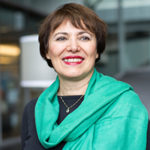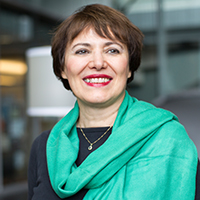
We are living in a difficult political environment that is in flux with a speed that most of us could not imagine. Many of the rights we have taken for granted and view as essential ingredients of a substantive democracy, such as the principle of equality under the law and freedom of expression, are under attack — if not completely discarded in practice — in some contexts and for some people. This environment is creating an urgency to rally to protect these rights but also question ourselves as academicians and wonder about the underlying causes as well as the role we played, or maybe more precisely did not play, in allowing the current state of affairs to happen.
Given my recent ordeal and incarceration in Iran on the charges of dabbling in feminism and security matters, the area that I would like to reflect on is academic freedom and the right to critical thinking. When asked in Iran about my publications and under whose order I conducted the research, I claimed I had academic freedom and no one could dictate to me what research I should conduct. The response to this claim was that academic freedom was a western idea and not valid here.
It was only when I was locked away in my jail cell and, as one of my interrogators sarcastically put it, “I had plenty of time to think about how my research and writings had led me to the notorious Evin prison.”
I took his advice. I used my months in jail to reflect and try to formulate my thoughts on the issue of academic freedom and the right to critical thinking. As I had no pen and paper, I used the tail end of my toothbrush as a pen and the walls of my cell as a writing pad and desk. One wall became the anthropology of an interrogation desk and the other wall was the academic freedom wall. I chose to use the physical act of writing on the wall because the process of writing for me is also a process of thinking and reflecting. Here are some of my points that I diligently wrote and memorized on the academic freedom wall of my prison cell.
I used my months in jail to reflect and try to formulate my thoughts on the issue of academic freedom and the right to critical thinking. As I had no pen and paper, I used the tail end of my toothbrush as a pen and the walls of my cell as a writing pad and desk.
My first thought was that I, like many of us, have taken the right to academic freedom for granted. Despite the fact that I taught human resources courses for over 15 years, I never discussed academic freedom and critical thinking in my classes. Moreover, although I had been part of academic institutions, either as a student or teacher in the UK and Canada since the age of 19, it was only when I was jailed that I realized I have never had much meaningful discussion about academic freedom with my colleagues. I, like most other academics, had viewed academic freedom as a folky, fuzzy right that we all are able to enjoy. And, even though I knew it is by its nature a collective right, I never tried to map the different dimensions of this collective right, nor did I spend time thinking about how it can be operationalized in our increasingly global context. Worse, I never reflected on the responsibility that goes with such a right.
I decided, once released, I shall discuss academic freedom and its twin, the right to critical thinking as often as I can — to remind myself and others that academic freedom is the right to think outside the box and reflect on issues critically. And, at times, the thinking may sometimes go against current accepted public views and more.
History has shown us that societies, as a whole, stand to benefit from critical thinking — although this may rattle the status quo and in the process ruffle the feathers of those who had been benefiting from it. Thus, it has always had a cost associated with it.
I came to imagine academic freedom, which incorporates the right to critical thinking, as a table with four legs.
The first leg is freedom to do research and publish without limitation and to teach in our areas of expertise.
The second leg is students’ academic freedom, which is something that is often not taken seriously.
The third leg is the right to participate in the managing of academic institutions, which for all practical purposes, we have largely lost in this neoliberal era. The primary focus of our institutions should be the promotion of the community interest and critical thinking, but universities are increasingly mostly run like corporations and it would take serious innovation to regain this aspect of academic freedom in any meaningful way.
The fourth leg is the right of academics and members of learning institutions to act as public intellectuals. As a matter of clarification on the fourth leg, the importance of academia acting or speaking publicly as intellectuals has diminished since the 1980s. There are many complex reasons behind this trend. One is media politics and increasing control of it by those who do not allow space for alternative views, particularly as it relates to diversity and structural discrimination that are at work in our society.
Moreover, media soundbites and an increasing appetite for sensationalism, a media disease, do not create a deep understanding of issues. Academics need to deal with complexities in a more in-depth but accessible style of communication. This is different from reductionism. There is also the assumption that participating in a public dialogue implies that one’s work is not sophisticated enough and may even lessen the recognition of one’s academic contribution. This kind of attitude has meant that the public, which funds our research, feel distanced and have grown weary of expert opinions and at times see our work as superfluous.
We as academics have the responsibility to tell the public what we do and in what way our work can contribute to the well-being of our society, both in the short and long run.
We as academics have the responsibility to tell the public what we do and in what way our work can contribute to the well-being of our society, both in the short and long run. At times, this might be especially difficult for humanities and social science academics since their work has less immediate tangible impact. We need to remind people that democracy, at least in part, has been the result of centuries of philosophical debates around social organization and social justice. It is also the work of humanities and social sciences that help us not to forget lessons from our histories, which have had important implications in our advancement, even if we have not yet achieved the utopia that society has been longing for. The creation of the Human Rights Declaration, the concept of Freedom of Expression, Representative Democracy, creation of art and learning to appreciate the beauty of nature, have in part, been the contributions of social sciences and humanities.
There are other important silences, if not a major neglect, in conventional discussion of academic freedom. I believe we should look at academic freedom as a transnational right.
It is now well established and accepted that academic freedom by its nature is a collective right. While we have worked to protect this right in the various institutions, we have failed to define who is in this collective and what are the boundaries of this collective. Is it our institutions? Is it our national boundaries? Or, is it as the title of the recent session at the 2017 Congress of the Humanities and Social Sciences implies; a borderless and global right?
Indeed, when we produce ideas, they are not just for one nation. Different communities around the world do not re-invent the wheel, as it is said. This is true particularly in today’s world, where we collaborate across national boundaries in many of our research projects and many, like myself, carry out research in other parts of the world. Therefore, it is essential to make academic freedom and the right to critical thinking a transnational right.
It isn’t possible to have critical thinking and academic freedom in Canada, and then, once one has entered into the air space of Iran or China, to lose that right. Clearly there is an urgency for us to find a way to make this freedom global.
A transnational right has to be anchored in the political and intellectual history of different cultures and regions from across the world.
However, to make a right transnational, some homework has to be done. A transnational right has to be anchored in the political and intellectual history of different cultures and regions from across the world. It is not enough that we refer to Greek and Italian intellectual history. The drive to critical thinking is as old as human societies. Other societies — including Indian, Chinese, Iranian, Egyptian, African and Latin American — have also have contributed to these developments.
Without this — academics worldwide doing our homework and bringing these unwritten chapters into the history of the world’s ideas and intellectual endeavours — we will not be able to realize academic freedom and the right to critical thinking as a set of transnational rights in practice. Disregard for these inclusions and historical aspects is the primary reason that the 20-year-old well-meaning and well-presented UNESCO document on academic freedom in higher education (1997), which was supposed to be a blueprint for international academic freedom, has remained unused in practice and has not played any significant role in promoting transnational academic freedom.
We have to bring the chapters of other nations into the debate. In other words, such a transnational right — as opposed to an international right — has to come from the ground up. If we had followed this route maybe others and I would not have been imprisoned for our academic endeavors. If we want to live in a borderless society where all humanity can contribute to and benefit from ideas and the advancement of sciences and social sciences and humanities we need to do our homework. At a minimum, we must work toward encouraging the documentation of intellectual history of other regions into our discourse on academic freedom. A next step may be looking at how such a right can be framed in various contexts for it to be in congruence with others while also accounting for its specificities, since we do live under different political and cultural systems. And, it is important to note that in this difficult global political climate, Canada is one of the countries that is well positioned and well placed to take the lead
Photo : Shutterstock/Tzido Sun
Do you have something to say about the article you just read? Be part of the Policy Options discussion, and send in your own submission. Here is a link on how to do it. | Souhaitez-vous réagir à cet article ? Joignez-vous aux débats d’Options politiques et soumettez-nous votre texte en suivant ces directives.









